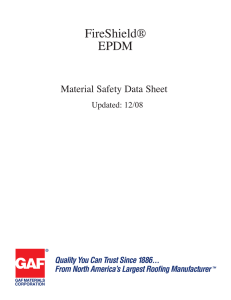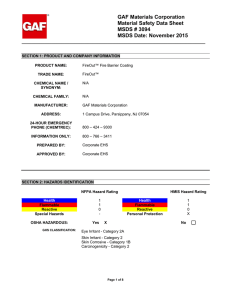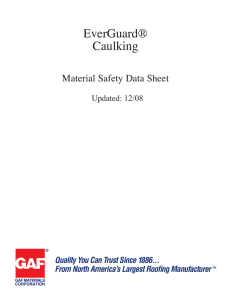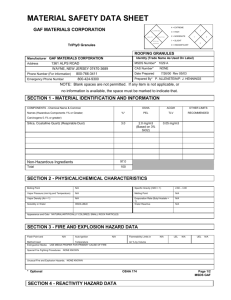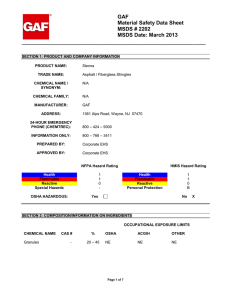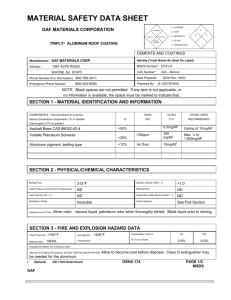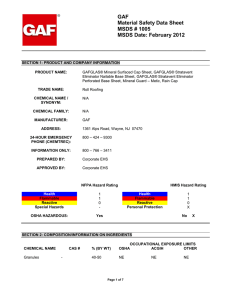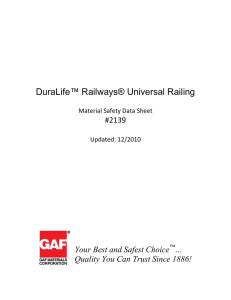TruSlate™ Field Slates, TruSlate™ Trim Slates Material Safety Data Sheet Updated: 3/09
advertisement
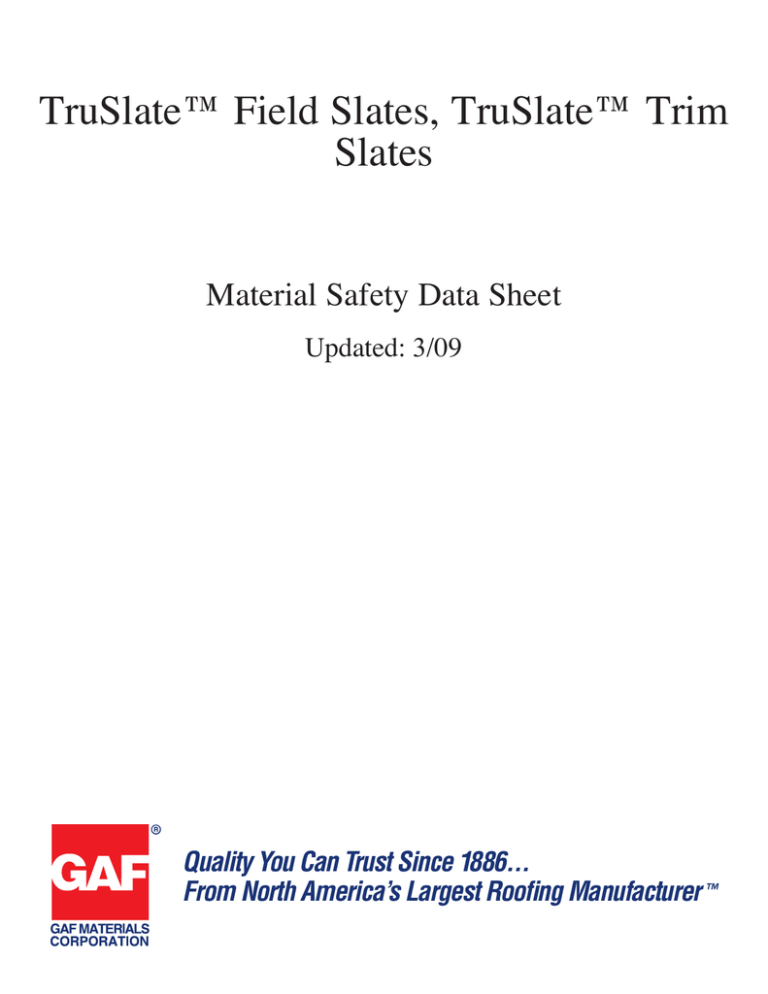
TruSlate™ Field Slates, TruSlate™ Trim Slates Material Safety Data Sheet Updated: 3/09 Quality You Can Trust Since 1886... From North America’s Largest Roofing Manufactur Quality You Can Trust Since 1886... From North America’s Largest Roofing Manufacturer ™ GAF Materials Corporation Material Safety Data Sheet MSDS # 2109 MSDS Date: March 2009 _________________________________________________________________________ SECTION 1: PRODUCT AND COMPANY INFORMATION TruSlate™ Field Slates, TruSlate™ Trim Slates PRODUCT NAME: TruSlate™ TRADE NAME: CHEMICAL NAME / SYNONYM: N/A CHEMICAL FAMILY: N/A GAF Materials Corporation MANUFACTURER: 1361 Alps Road, Wayne, NJ 07470 ADDRESS: 24-HOUR EMERGENCY PHONE (CHEMTREC): 800 – 424 – 9300 INFORMATION ONLY: 800 – 766 – 3411 PREPARED BY: Corporate EHS APPROVED BY: Corporate EHS NFPA Hazard Rating 0 0 0 - Health Flammable Reactive Special Hazards OSHA HAZARDOUS: HMIS Hazard Rating 0 0 0 B Health Flammable Reactive Personal Protection No Yes X SECTION 2: COMPOSITION/INFORMATION ON INGREDIENTS OCCUPATIONAL EXPOSURE LIMITS CHEMICAL NAME * CAS # % (BY WT) Silicon Dioxide (crystalline silica) ** 14808-60-7 40 – 60 OSHA ACGIH OTHER 10 mg/m3 / (% 0.025 mg/m3 – resp. REL: 0.05 mg/m3 – resp. SiO2 + 2) – resp. Page 1 of 7 GAF Materials Corporation MSDS # 2109 OCCUPATIONAL EXPOSURE LIMITS CHEMICAL NAME CAS # % (BY WT) OSHA ACGIH OTHER Aluminum Oxide 1344-28-1 15 – 25 5 mg/m3 – resp. 15 mg/m3 – total 1 mg/m3 – resp. REL: 1.5 mg/m3 – resp. Iron Oxide 1309-37-1 5 – 10 10 mg/m3 – fume 5 mg/m3 – resp. REL: 5 mg/m3 Potassium Oxide 12136-45-7 2 – 10 NE NE NE Magnesium Oxide 1309-48-4 2 – 10 15 mg/m3 – total 10 mg/m3 NE Calcium Carbonate 1317-65-3 1–5 5 mg/m3 – resp. 15 mg/m3 – total 3 mg/m3 – resp. 10 mg/m3 – total REL: 5 mg/m3 – resp., 10 mg/m3 – total Sodium Oxide 1313-59-3 1–5 NE NE NE Calcium Oxide 1305-78-8 1–5 5 mg/m3 2 mg/m3 REL: 2 mg/m3 NE = Not Established * As defined in the OSHA Hazard Communication Standard, 29 CFR 1910.1200, the products above are considered articles and do not require an MSDS. However, GAF would like to disclose as much health and safety information as possible to ensure that this product is handled properly. All components listed for this product are bound. When handled as intended and under normal conditions, none of the ingredients should be released and should not pose a significant health risk. ** This composition of silicon dioxide (SiO2) may be be up to 100% crystalline silica. SECTION 3: HAZARDS IDENTIFICATION PRIMARY ROUTE OF EXPOSURE: Inhalation (occasional nuisance dust) – no exposure expected when handling under normal conditions. Dust exposure is possible when mechanical manipulation (sawing, cutting, etc.). SIGNS & SYMPTOMS OF EXPOSURE EYES: May cause mechanical irritation to the eyes. SKIN: May cause mechanical irritation to the skin. Product can have sharp edges which may cause abrasions to the skin. INGESTION: This product is not intended to be ingested. If ingested, it may cause temporary irritation to the gastrointestinal (digestive) tract. INHALATION: May cause irritation to the respiratory tract. ACUTE HEALTH HAZARDS: See above. CHRONIC HEALTH HAZARDS: Long term exposure to silica can lead to significant health effects. Page 2 of 7 GAF Materials Corporation MSDS # 2109 Crystalline silica has been classified as a human carcinogen. Additionally, crystalline silica exposure can cause silicosis, which can be disabling or even fatal. Respirable silica dust can cause the formation of scar tissue which affects the lungs’ ability to take in oxygen. A person with silicosis is more susceptible to lung infections like tuberculosis. Smoking adds to the damage caused by breathing silica dust. The International Agency for Research on Cancer (IARC) and the National Toxicology Program (NTP) have determined that there is sufficient evidence in humans for the carcinogenicity of inhaled crystalline silica in the form of quartz or cristobalite. In addition, IARC has determined that there is sufficient evidence for the carcinogenicity of quartz and cristobalite in experimental animals. Among individuals with silicosis, lung cancer occurs more frequently in those who smoke. CARCINOGENICITY: SECTION 4: FIRST AID MEASRURES FIRST AID PROCEDURES EYES: Hold eyelids open and wash with gentle stream of water for at least 15 minutes preferably at eyewash fountain. SKIN: Wash affected area thoroughly with soap and water. INHALATION: Remove to fresh uncontaminated air. INGESTION: Not expected to be ingested. NOTES TO PHYSICIANS OR FIRST AID PROVIDERS: No information available SECTION 5: FIRE FIGHTING PROCEDURES SUITABLE EXTINGUISHING MEDIA: Water spray, Alcohol foam, Carbon Dioxide, or Dry chemical. HAZARDOUS COMBUSTION PRODUCTS: The slate shingle itself does not burn. If involved in a fire, carbon dioxide and carbon monoxide may be released. RECOMMENDED FIRE FIGHTING PROCEDURES: N/A UNUSUAL FIRE & EXPLOSION HAZARDS: N/A Page 3 of 7 GAF Materials Corporation MSDS # 2109 SECTION 6: ACCIDENTAL RELEASE MEASURES Pick up or sweep up large pieces. Avoid creating dust during clean up. ACCIDENTAL RELEASE MEASURES: SECTION 7: HANDLING AND STORAGE HANDLING AND STORAGE: No specific handling or storage requirements. OTHER PRECAUTIONS: None SECTION 8: EXPOSURE CONTROLS/PERSONAL PROTECTION ENGINEERING CONTROLS / VENTILATION: N/A RESPIRATORY PROTECTION: Respiratory protection may be needed when mechanically manipulating this product (sawing, cutting, etc.). If respiratory protection is selected, a NIOSH-approved dust mask or respirator should be worn. Selection and use of specific respirators should meet applicable standards set by state and Federal OSHA standards for respiratory protection. EYE PROTECTION: Safety glasses with side shields. SKIN PROTECTION: Cotton or leather gloves are recommended when handling. OTHER PROTECTIVE EQUIPMENT: None WORK HYGIENIC PRACTICES: Wash exposed skin prior to eating, drinking or smoking and at the end of each shift. EXPOSURE GUIDELINES: N/A SECTION 9: PHYSICAL AND CHEMICAL PROPERTIES APPEARANCE & ODOR: Various colored slate shingles; no appreciable odor. FLASH POINT: No data LOWER EXPLOSIVE LIMIT: No data METHOD USED: No data UPPER EXPLOSIVE LIMIT: No data EVAPORATION RATE: Not applicable BOILING POINT: > 4000 °F pH (undiluted product): No data MELTING POINT: > 3000 °F Page 4 of 7 GAF Materials Corporation MSDS # 2109 Insoluble SOLUBILITY IN WATER: VAPOR DENSITY: Not applicable PERCENT VOLATILE: VAPOR PRESSURE: Not applicable MOLECULAR WEIGHT: 0 VOC WITH WATER (LBS/GAL): 2.65 SPECIFIC GRAVITY: 0 No data WITHOUT WATER (LBS/GAL): 0 SECTION 10: STABILITY AND REACTIVITY THERMAL STABILITY: STABLE X UNSTABLE CONDITIONS TO AVOID (STABILITY): None known. INCOMPATIBILITY (MATERIAL TO AVOID): Hydrofluoric acid (HF) – HF can dissolve silica to produce silicon tetrafluoride which is a corrosive gas. HAZARDOUS DECOMPOSITION OR BYPRODUCTS: None known. HAZARDOUS POLYMERIZATION: Will not occur. _________________________________________________________________________________________ SECTION 11: TOXICOLOGICAL INFORMATION TOXICOLOGICAL INFORMATION: No information available. SECTION 12: ECOLOGICAL INFORMATION ECOLOGICAL INFORMATION: No information available. _________________________________________________________________________________________ SECTION 13: DISPOSAL CONSIDERATIONS WASTE DISPOSAL METHOD: This product, as supplied, is not regulated as a hazardous waste by the U.S. Environmental Protection Agency (EPA) under Resource Conservation and Recovery Act (RCRA) regulations. Comply with state and local regulations for disposal. RCRA HAZARD CLASS: None Page 5 of 7 GAF Materials Corporation MSDS # 2109 SECTION 14: TRANSPORTATION INFORMATION U.S. DOT TRANSPORTATION PROPER SHIPPING NAME: This product is not classified as a hazardous material for transport. HAZARD CLASS: N/A ID NUMBER: N/A PACKING GROUP: N/A LABEL STATEMENT: N/A OTHER: N/A SECTION 15: REGULATORY INFORMATION U.S. FEDERAL REGULATIONS TSCA: This product and its components are listed on the TSCA 8(b) inventory. CERCLA: None SARA 311/312 HAZARD CATEGORIES: None 313 REPORTABLE INGREDIENTS: None This product contains a chemical known to the state of California to cause cancer and birth defects, or other reproductive harm. Cancer: crystalline silica. CALIFORNIA PROPOSITION 65: Other state regulations may apply. Check individual state requirements. The following components appear on one or more of the following state hazardous substances lists: Chemical Name CAS # CA MA MN NJ PA RI Crystalline Silica 14808-60-7 Yes Yes Yes Yes Yes Yes Aluminum Oxide 1344-28-1 Yes Yes Yes Yes Yes Yes Iron Oxide 1309-37-1 No No Yes Yes Yes Yes Potassium Oxide 12136-45-7 No No No Yes No No Page 6 of 7 GAF Materials Corporation MSDS # 2109 Magnesium Oxide 1309-48-4 Yes Yes Yes Yes Yes Yes Calcium Carbonate 1317-65-3 No Yes Yes No Yes Yes Sodium Oxide 1313-59-3 No No No Yes No No Calcium Oxide 1305-78-8 Yes No Yes Yes Yes Yes SECTION 16: OTHER INFORMATION ADDITIONAL COMMENTS: None DATE OF PREVIOUS MSDS: New MSDS CHANGES SINCE PREVIOUS MSDS: N/A This information relates to the specific material designated and may not be valid for such material used on combination with any other materials or in any process. Such information is to the best of our knowledge and belief accurate and reliable as of the date compiled. However, no representation, warranty or guarantee, expressed or implied, is made as to its accuracy, reliability, or completeness. It is the user’s responsibility to satisfy himself as to the suitability and completeness of such information for his particular use. We do not accept liability for any loss or damage that may occur from the use of this information. Nothing herein shall be construed as a recommendation for uses which infringe valid patents or as extending a license of valid patents. Page 7 of 7
